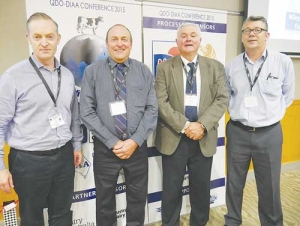Markets resilient, farmers hopeful
OPINION: The global dairy market continues to show resilience, and farmers remain cautiously optimistic as we move into the latter half of 2025.
 Lion Dairy & Drinks managing director Peter West with Norco deputy chair Tony Wilson, QDO’s Wesley Judd, and Parmalat national manager, farm sustainability and communication, Steve Oldridge.
Lion Dairy & Drinks managing director Peter West with Norco deputy chair Tony Wilson, QDO’s Wesley Judd, and Parmalat national manager, farm sustainability and communication, Steve Oldridge.
Queensland farmers have received a sobering message about the effects of a supermarket war on the price of milk and dairy products.
Lion Dairy & Drinks managing director Peter West told farmers at the recent Queensland Dairy Conference to brace for lower milk prices.
The price wars in the regular milk category started in 2011 when major retailer Coles unveiled A$1/L milk; rival supermarket chain Woolworths quickly matched the offer. Coles recently set the lowest mark yet for the product, cutting the cost from A95c/L to A90c/L.
“The prices I get today will be lower next year, lower the year after and the year after that,” West said. “I can guarantee you there will be five years of price deflation.”
He said a strategy of pursuing growth opportunities and cutting costs was driving Lion’s response, highlighting that consumer trends towards full fat milk, butter, coffee and natural products was great for the sector.
“DARE iced coffee now outsells Coca-Cola in convenience stores,” he said. “This is a market in enormous change and transition [and] it is the future of a more vibrant dairy industry.”
He said the need for authenticity in products – supported by the government’s new country of origin labelling laws – will also bode well for Australian dairy, but he urged caution about seeing China as the saviour of industry.
“The opportunities are there but it will be volatile and harder than everybody thinks. This market is hugely sophisticated and competitive.”
The company has also launched a new ‘Milk Matters’ campaign to remind local consumers of the effort that goes into producing a litre of milk.
“We want people to think again about all the work that went into that product, and we want them to have an emotional reaction to the things they take for granted -- your hard work required for this product that [often costs less] than water. [We want them to ask], is that right?”
The company has cut budgets and staff and offloaded its cheese businesses in an “unrelenting” effort to reduce costs.
West said a “strong focus on mutuality” – supporting farmers to be viable and successful – was also a focus of their approach and the company is looking to help suppliers reduce costs, eg by bulk energy purchasing.
“We all want to see the notion of a fair price. There will always be a tension about how much that is, but our aim will always be to pay the maximum we can afford.”
Parmalat’s Steve Oldridge told of new measures to help farmers save production costs including bulk energy and feed, and benchmarking tools and increased communication with farmers. He said the company and was looking to ensure suppliers had sustainable profit margins.
Legal controls on the movement of fruits and vegetables are now in place in Auckland’s Mt Roskill suburb, says Biosecurity New Zealand Commissioner North Mike Inglis.
Arable growers worried that some weeds in their crops may have developed herbicide resistance can now get the suspected plants tested for free.
Fruit growers and exporters are worried following the discovery of a male Queensland fruit fly in Auckland this week.
Dairy prices have jumped in the overnight Global Dairy Trade (GDT) auction, breaking a five-month negative streak.
Alliance Group chief executive Willie Wiese is leaving the company after three years in the role.
A booklet produced in 2025 by the Rotoiti 15 trust, Department of Conservation and Scion – now part of the Bioeconomy Science Institute – aims to help people identify insect pests and diseases.